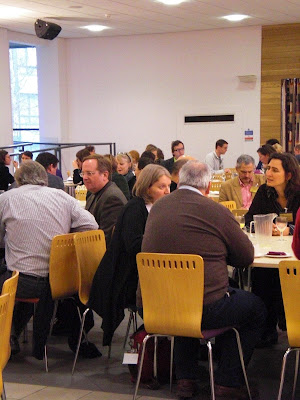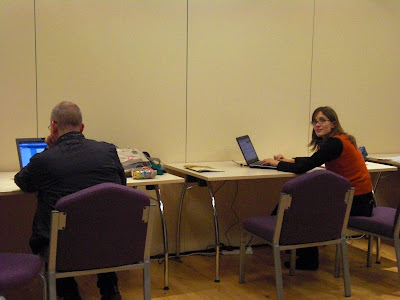Cross-posted at The Attic.
So, Material Worlds is over. My first conference paper is presented. My love-hate relationship with University Catering has been renewed. I've caught up with old friends and met new, always a joyful occurrence. My hopes for the Material Worlds blog were not fulfilled, but to be fair, the action-packed programme left little lee-way for 'panopic' (good word, eh?) blogging. But, while the conference is over, the blog will remain open and active, at least in the immediate future. Place your doubts and fears aside, seize the day and BLOG, dammit! We'll be gentle with you...honest. ;)
Wednesday 17 December 2008
Tuesday 16 December 2008
Creative Workshop: The poetic triangle of objects, people and speaking
I have just come back from the most fascinating and inspiring workshop led by Nikki Clayton, former PhD student in the Department and now Open Museum Officer for Leicestershire. She was to be joined by the poet Mark Goodwin, but he was - unfortunately - unwell. However, Nikki coped admirably without him!
The session took the form of a the poetry workshops run by Nikki and Mark for school and community groups in Leicester, albeit an abbreviated version. Our small group undertook a series of short free-writing exercises based upon the contents of two different resource boxes, the first held six miniature model chairs. These objects formed the basis of our first exercise. We wrote for three minutes non-stop using the chairs as triggers for our creativity. My list inevitably consisted of a list of descriptors, but already several in our group were displaying quite a talent for creative writing. Although, as one of those was a published author of poetry in his native Iceland (*coMagnusugh*), I wasn't surprised!
The next exercise involved folding a sheet of paper in half lengthways. On the right-hand side we wrote another stream of consciousness this time prompted by a collection of model rural homes (thatched cottages, half-timbered houses, etc). This inspired an outpouring of homesickness from me. This task was followed up by writing on the other half of the paper on the subject of deserts. My response rather made me fear my state of mental health, to be honest. Clearly in a very dark and depressive mood. ;) Finally, we wrote a new 'poem' using the words written on both halves of the paper. This created some really brilliant results, very evocative. I would reproduce my effort here, but Nikki collected up our poems to pass onto Mark, who has been commissioned to produce a work for the conference based on our creative writing produced in the session. We suggested that perhaps we should receive a share of the profits!
The discussion that followed revealed the potential of such an approach to museum objects, especially with regard to working with mixed ability groups and people for whom English is not a first language. Very inspiring.
All in all it was a very enjoyable session. Anyone who couldn't make it missed a treat. It was fantastic to sit down and do something quite different - beyond the conference 'norm' - for a couple of hours. I only wish I could write my thesis using a similar method!
The session took the form of a the poetry workshops run by Nikki and Mark for school and community groups in Leicester, albeit an abbreviated version. Our small group undertook a series of short free-writing exercises based upon the contents of two different resource boxes, the first held six miniature model chairs. These objects formed the basis of our first exercise. We wrote for three minutes non-stop using the chairs as triggers for our creativity. My list inevitably consisted of a list of descriptors, but already several in our group were displaying quite a talent for creative writing. Although, as one of those was a published author of poetry in his native Iceland (*coMagnusugh*), I wasn't surprised!
The next exercise involved folding a sheet of paper in half lengthways. On the right-hand side we wrote another stream of consciousness this time prompted by a collection of model rural homes (thatched cottages, half-timbered houses, etc). This inspired an outpouring of homesickness from me. This task was followed up by writing on the other half of the paper on the subject of deserts. My response rather made me fear my state of mental health, to be honest. Clearly in a very dark and depressive mood. ;) Finally, we wrote a new 'poem' using the words written on both halves of the paper. This created some really brilliant results, very evocative. I would reproduce my effort here, but Nikki collected up our poems to pass onto Mark, who has been commissioned to produce a work for the conference based on our creative writing produced in the session. We suggested that perhaps we should receive a share of the profits!
The discussion that followed revealed the potential of such an approach to museum objects, especially with regard to working with mixed ability groups and people for whom English is not a first language. Very inspiring.
All in all it was a very enjoyable session. Anyone who couldn't make it missed a treat. It was fantastic to sit down and do something quite different - beyond the conference 'norm' - for a couple of hours. I only wish I could write my thesis using a similar method!
Authenticity of Objects and Experience - Session Review
This was a fascinating session looking at issues surrounding the authenticity of objects and, in particular, the consideration of whether reproductions can really be an adequate substitute for the 'real thing.' I left this session with the impression that reproductions are perhaps an inadequate substitute, although in a world where we have access to more information than previous generations through the Internet etc we are more than ever able to have access to the 'real thing' even if it is not in the actual context. This perhaps sounds more complicated than I intend it! But it raises really important issues for me as I am interested in looking at 'living history' and whether this can be an adequate substitute for the history that it is re-creating. However in living history we cannot go back to the 'real' event to check the authenticity unlike we can compare a digital object to the real object as some of the experiments talked about in this session were endeavouring to do e.g. comparing the experience of a real painting to the same painting in different formats. It was interesting to see some examples of scientific research in this area which focuses on controlling what seems to me to be a very complex and rich experience and although I am interested in the results of these experiments it does raise lots of issues for me as to how this could be applied in practice - do we want visitors to museums to look at paintings in certain ways, should it be something that could be taught in schools for instance or would this impact on the immediacy of the visit?
Thank you to Klare Scarborough, Bradley Taylor, Helen Saunderson and Chris Dorsett for an interesting discussion!
Thank you to Klare Scarborough, Bradley Taylor, Helen Saunderson and Chris Dorsett for an interesting discussion!
Monday 15 December 2008
Welcome to Material Worlds!
This blog will record the thoughts, observations and comments of delegates at the Material Worlds conference in honour of Professor Susan Pearce, which kicked off a few hours ago, here at the University of Leicester.
The blog is open to all to comment - please feel free to join the discussions and get involved!
Anna and I (regulars over at The Attic - the Department of Museum Studies' research student blog) will be here over the next three days helping out, offering techie advice (!) and blogging as much as possible, 'though it has to be said, as we'll be spending most of our time closeted away in the Rothley Room tip-tapping away on our keyboards, only leaving our desks for food and drink, our posts might not be as devastatingly exciting as those of our blogging colleagues!
If you're not attending the conference, but following it virtually, please feel free to contact us by email.
Happy blogging!
The blog is open to all to comment - please feel free to join the discussions and get involved!
Anna and I (regulars over at The Attic - the Department of Museum Studies' research student blog) will be here over the next three days helping out, offering techie advice (!) and blogging as much as possible, 'though it has to be said, as we'll be spending most of our time closeted away in the Rothley Room tip-tapping away on our keyboards, only leaving our desks for food and drink, our posts might not be as devastatingly exciting as those of our blogging colleagues!
If you're not attending the conference, but following it virtually, please feel free to contact us by email.
Happy blogging!
Tuesday 9 December 2008
Subscribe to:
Posts (Atom)














